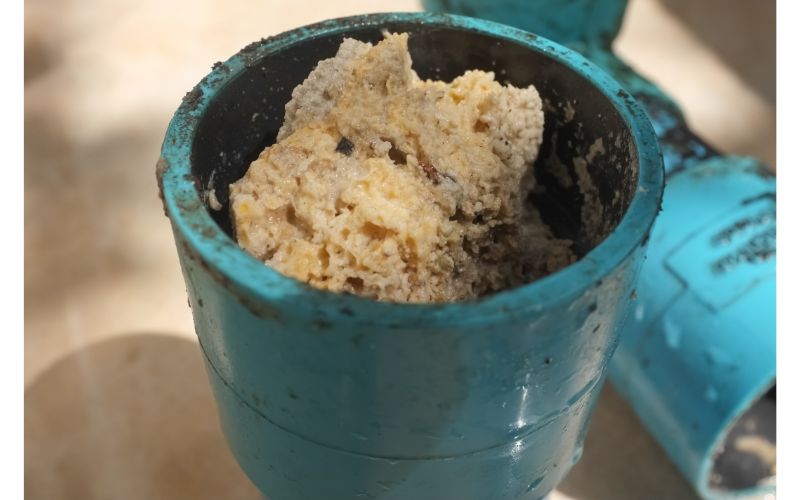Boiling hot water mixed with white vinegar is an effective way to dissolve grease in the pipe. However, if you want to prevent grease buildup, simply don’t pour greasy materials into the pipe.
We know we are asking too much, but there is no other way that can save you. Nevertheless, there are some measures that can help reduce the pain.
People don’t actually pour grease into their pipes. It’s our daily household chores that contribute to the grease buildup in the pipeline. From the dishes you prepare for dinner to the soap you use to wash the utensils, everything has a notable contribution to grease buildup.
What Causes Grease Buildup?
A thousand things contribute to grease buildup. However, there are a few that play a major role. If you really want to prevent grease buildup, you surely need to have a proper understanding of what causes it.
We can categorize them into mainly two groups. Anything that is used to prepare the meal and agents that you use to clean the dishes. Here we will break these down and let you know how your pipe gets blocked.
Food Ingredients
Everything you use to prepare a meal either contains fat or oil. When you let the leftover travel through the pipeline, it does not always make it all the way to the sewage tank. Being oily and greasy helps them get stuck in the inner wall of the pipe.
When similar instances occur again, they just layer over the previous buildup. Which, after a few weeks or months, become strong and adamant enough to block the pipe.
Whatever you cook, from meat, dairy, and rice to coffee grounds, eggshells, and even vegetables cooked in oils, releases either grease, oil, or fat as a by-product. The most alarming fact, however, is that grease buildup in a pipe line mostly remains unnoticed until the pipe is completely blocked.

Cleaning Agents Used In The Kitchen
Dinner was great, but you can’t rest until the utensils are cleaned. That’s where another major contributor to grease buildup, “Soap” comes into action. You may wonder how in the world a cleaning agent can block a pipe. Here is how…
Soap is nothing but a combination of animal and vegetable fats. When released through the drain line, it acts similar to food scraps and starts to build layers over any previous buildup. Repeating this at one point leads to a grease clogged drain.
How To Prevent Pipe Clogging
A question worth a million. We all know prevention is better than cure, and it’s true in every aspect of life. Grease buildup could lead to a host of other problems. However, if you can prevent grease from clogging your drain line, life will be much easier for you. Now the question is, How?
Here is how…….
→ Make sure that you use high grade pipe for your drain line that can withstand all the treatment required to keep it clean.
→ Arm your plughole with a mesh that will filter most of the food scraps. It will alter the whole thing by letting water flow through the drain and blocking the large and solid scraps.
→ Make sure that utensils are as free of oil and leftovers as possible before you take them to the sink.
→ Kitchen roll is a great grease remover. Wipe utensils with it before cleaning.
→ Use dish soap instead of just washing with tap water.
→ Use fat-free soaps for cleaning.
→ Use hot water for cleaning (if possible).
→ Don’t drain excess fat and oil from cooking into the sink.
→ Even after doing all this, you will still have some greasy dishes to wash in the sink. Just immerse them in soapy water for a while to make them oil and fat free.
Some Day End Activities That Can Save Your Pipeline
Some less laborious procedures at the end of the day can save you from a catastrophe.
- Flush the drain with a kettle of hot water at the end of the day.
- For the best result, mix half a cup of vinegar with hot water and rinse the drain line.
- Pour disinfectant solution (a mix of tap water and liquid antiseptic) into the pipeline each day.
- To eliminate the odor, you can mix flavored antiseptic into the solution.
Why Grease and Oil Create Buildup Instead of Climbing Down
It is fair to think that these substances will simply wash off with water. But what if I say that water is the main culprit. Yes, it’s water mixing with them that makes them hard.
Food waste gets carried down the plughole by water. Water keeps flowing, but the fat and oil react with the water and air inside the pipeline. As a result, it starts to solidify, which makes it float over flowing water. Over time, this floating substance starts to form a coating on top of the pipe.
This whole process is so slow and gradual that, until it’s too late, you won’t notice anything. The effects, however, are quite deadly. Therefore, your approach should be appropriate as well.
How To Know It’s Grease Inside?
Drain lines can be blocked for a whole lot of reasons. A blockade does not necessarily mean that there is grease buildup inside. Before you start to look for grease buildup solutions, it’s equally important to know that your effort is going in the right direction. For grease caused blockades, there are a few signs to notice.
You will notice slow water drainage in the first place. It’s not something that happens overnight. Staying alert may give you an early warning.
Secondly, due to erratic water drainage, a gurgling sound comes from the drain. Additionally, if you overflow the sink by any chance, it will generate bubbles.
Finally, and most importantly, a bad and persistent odor will be noticed in the sink area. Bad odor is common in the sink and disappears if you pour water into the drain line. But, this one is different and won’t go away, no matter what you do.
How to Get Rid Of Grease Buildup
Well, if you are certain that it was none other than grease that blocked your drain line, pull yourself up immediately. Depending on the extent of the problem, the response varies.
Our immediate reaction to grease buildup is to look for a plunger. Trust me, this would be the worst response one could deploy to deal with a clog. If your luck favors you the most, it won’t do anything. If not, it will make things worse by pushing the clog deeper.
You better follow the following steps…..
Well, before you get into the action, make sure that your drain line can withstand the treatment, as it involves hot water and other chemical substances.
Empty The Sink
With a clogged drain, it’s highly likely that your sink is filled with water and scraps. Start with unloading the water. When done, make sure that the plughole is clear so that your remedies reach the clog right away.
Hot Water and Hot Water
You may have heard of a lot of things, but it’s hot water that can change the whole game. Often, we ignore readily available solutions and do things the hard way. Complement boiling hot water with a bit of dish soap or vinegar: game over. You will need 4 to 5 kettles of boiling hot water for the whole operation.
→ Pour some hot water through the drain line and allow it at least 4 to 5 minutes to act. That will get half the job done. Now pour 20 to 30 grams of dish soap and follow it up with another kettle of hot water. This should be enough to restart the drainage system again.
→ The clog is broken now and easy to clear. Most people stop there and think they are done, when they aren’t. Pour another 2 to 3 kettles of boiling water consecutively, thereby washing away the debris. Otherwise, they will start to re-collect deep down in the pipeline again.
→ If the above mentioned procedure fails you, bring vinegar into action. Prepare a mix of equal amounts of hot water and vinegar. Flush the mix through the drain line. Run hot water from your faucet for at least 4 to 5 minutes to make sure that the debris won’t be able to re-collect again.
There are some other procedures to follow if the issue persists. Compressed air or a CO2 drain gun, for example, is an effective method. One can even deploy a Hydro Sewer Jet to address grease buildup.
Remember, these are the options only if your previous efforts proved ineffective. We highly recommend a professional hand if you are to use any of these methods.
Conclusion
Keeping our drain line clog free is no less than an arduous task. No matter how much effort you make at one point, you have to face it. However, that should not hold you back from making all the efforts.
A clog free pipeline is so important that you can’t just rest easy and be foolish. Act immediately whenever a grease buildup is discovered in the pipeline. But it is in your best interest to deploy the prevention measures.

